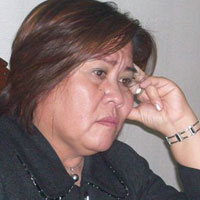MANILA — A lawyer has filed a disbarment case against Department of Justice (DOJ) Secretary Leila De Lima before the Office of the Bar Confidant of the Supreme Court (SC).
In a nine-page complaint, Atty. Ricardo Rivera asked the SC that De Lima should immediately be placed under investigation by the Integrated Bar of the Philippines (IBP) Board of Governors.

The complaint was based on the non-compliance of De Lima on the temporary restraining order (TRO) issued by the SC en banc on Nov. 15, 2011 against the implementation of the watchlist order (WLO) issued by the DOJ against former President and now Pampanga (2nd District) Rep. Gloria Macapagal-Arroyo and her husband former First Gentleman Atty. Jose Miguel “Mike” Arroyo.
Rivera said that such refusal of the DOJ Chief to comply with the TRO weakens the trust of the public to the Judiciary and the judicial system.
Rivera said a preventive suspension should be imposed against De Lima while the investigation against her is pending.
As officers of the court, Rivera said, they should follow the rule of law, which De Lima had violated.
Rivera also asked the SC that the investigation of the case be immediately directed to the IBP Board of Governors.
After the disbarment proceedings, the complainant also asked that De Lima’s license to practice law should be revoked and that her name should be deleted from the Roll of Attorneys.
De Lima complied on Monday with the “show cause order” issued to her by the Supreme Court (SC) on November 18, 2011.
The SC required De Lima to show cause why she should not be subjected to disciplinary action and cited in contempt of court for her refusal to comply with the temporary restraining order (TRO) issued by the SC en banc on November 15 against the implementation of the watch list order (WLO) issued by the DOJ against the Arroyo couple.
In her 17-page compliance, De Lima said that Section 4, Rule 71 of the Rules of Court provides that when the proceedings for indirect contempt are initiated by the court motu propio (on its own), the same is made by an order of, or formal charge by, the court.
As with any formal charge, De Lima said, the “same should have contained the particular factual allegations constituting the alleged contumacious acts being charged against respondent, as well as the specific violation or offense committed.”
However, De Lima noted that other than a general allegation of her “failure to comply with the November 15, 2011 Temporary Restraining Order” (TRO) of the SC, the November 18, 2011 resolution cites no factual antecedents constituting the acts or declarations, if any, of respondent that would comprise the basis for the show cause order.
De Lima said since the show cause order did not cite any predicate factual antecedent constituting the alleged contumacious act, respondent has no predicate allegations and supporting particulars of factual antecedents on which to base a comprehensive response to the show cause order.
De Lima argued that the November 15, 2011 TRO was not yet effective on said day for lack of proper service to respondent and counsel.
She said that the November 15 TRO is not a simple TRO. It is a TRO based on conditionalities, effective immediately subject to compliance with said conditions.
The DOJ chief further argued that the November 18, 2011 show cause order itself notes that there has been no actual compliance by petitioners with the conditions of the TRO.
De Lima said that the punishment for any contumacious act, as provided in Rule 71, is imprisonment or fine; it does not include disciplinary action on respondent as a member of the Philippine Bar.



 ShareThis
ShareThis